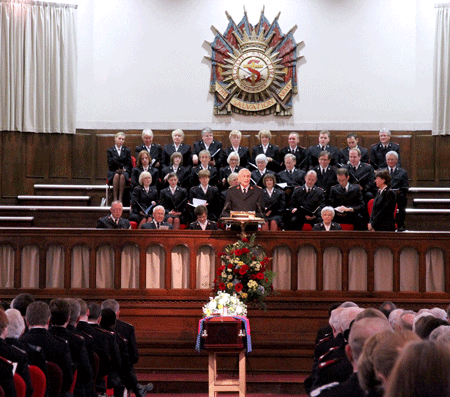Army’s Work Continues Despite Recent Ethnic Fighting
By Cadet Lisa Smith –
Nearly one million Rwandans have again fled for their lives, this time from refugee camps in Goma, Zaire, where fierce fighting has erupted between local authorities and ethnic Tutsis. The camps are situated just 60 miles from The Salvation Army’s work in Kayenzi.
Since fleeing the massacres of Rwanda during their 1994 civil war, the refugees have lived in these camps, often enduring horrible conditions and rampant disease. Now, they are scattering throughout Eastern Zaire without food, water or medicine, items which humanitarian aid agencies had been supplying them in the camps.
The crisis has become so dangerous that all foreign aid workers were evacuated from Goma on November 2. With these relief agency headquarters abandoned, the supplies designated for the refugees have been looted and are controlled by criminals and rebels.
It remains to be seen if the refugees will remain scattered, gather into camps in Zaire, or try and make their way back to Rwanda. In the midst of such chaos, humanitarian aid in the Goma area has been suspended, at least until the situation stabilizes a bit more.
The Salvation Army’s work in Rwanda is centered in Kayenzi, and it continues with outposts in neighboring communities of Rutobwe, Taba, and Nyabikenke. Major Roland Sewell, coordinator of emergency and refugee services at International Headquarters, met with other aid agencies recently at the Rwandan embassy in London. The ambassador, Dr. Z. Nsenga, told relief agency workers that the best response to this crisis would not be to set up new refugee camps in Zaire, which have been part of the ongoing problem of unrest in that country. The best response, he said, would be to work on agriculture, education and health programs within Rwanda, making the conditions the best they can be to encourage the refugees to return to their homes in Rwanda.
“That’s exactly what the Army has been doing for the past two years,” states Sewell. The Army has been hard at work in and around Kayenzi rehabilitating health centers destroyed in the war, implementing vocational training programs, revitalizing the agriculture of the region, and managing a micro-credit program which facilitates enterprise (like cooperatives) for groups of people in the community.
They have also rebuilt 262 destroyed homes, in addition to cleansing and protecting 201 water sources. “Our credibility in Rwanda is still high,” says Sewell, “and our presence in this area gives us a foothold from which to expand our humanitarian relief should the situation call for it.”
In the meantime, The Salvation Army continues to carefully monitor the situation–alert and poised to help where needed. “We have instructed Salvation Army leaders and relief workers in Rwanda to stay in touch with the United Nations Command Headquarters in Kigali and to keep IHQ informed daily. If there arises in this crisis a specific role which we could fill, we will address that need at that time,” reports Sewell.
Government officials are currently holding conferences, both in Rwanda and Kenya, to discuss how to deal with the desperate situation of these vulnerable refugees. One option under discussion is the creation of a “humanitarian corridor,” a safe passage through which these refugees could find their way back home to Rwanda. The hope is that refugees would decide, in light of the current difficulties in Zaire, that it may now be time to go back home to Rwanda.
The Tutsis took control of the government in Rwanda in June of 1994 after the extremist Hutus in power had exterminated nearly one million Tutsis and moderate Hutus.
When images of these massacres filled international news reports, then newly-elected General Paul A. Rader immediately commissioned a team of Salvation Army relief workers to go into Rwanda and offer assistance in the midst of that tragedy. The work begun then continues today.
(Ed. note: The author of this article, then Lt. Lisa Brodin, served on the Army’s first relief team in Rwanda.)













